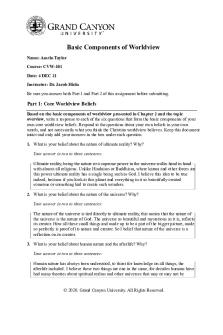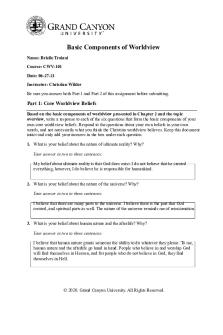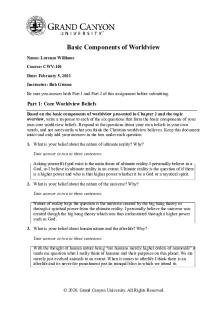Basic Components PDF

| Title | Basic Components |
|---|---|
| Author | Anna Kelly |
| Course | Christian Worldview |
| Institution | Grand Canyon University |
| Pages | 3 |
| File Size | 226.3 KB |
| File Type | |
| Total Downloads | 54 |
| Total Views | 158 |
Summary
I got a 49.25/50 on this assignment...
Description
Basic Components of Worldview Name: Anna Kelly Course: CWV-101 Date: 1/14/2021 Instructor: Jonathan Sharpe Be sure you answer both Part 1 and Part 2 of this assignment before submitting.
Part 1: Core Worldview Beliefs Based on the basic components of worldview presented in Chapter 2 and the topic overview, write a response to each of the six questions that form the basic components of your own core worldview beliefs. Respond to the questions about your own beliefs in your own words, and not necessarily what you think the Christian worldview believes. Keep this document intact and only add your answers in the box under each question. 1. What is your belief about the nature of ultimate reality? Why? Your answer in two to three sentences: I am not 100% sure what I believe. I believe that there is something but I am not sure what it is. I believe this because I know that there is something but I do not think that it is one all mighty being. 2. What is your belief about the nature of the universe? Why? Your answer in two to three sentences: I believe that the universe is a physical thing not an illusion. Going through life and doing things makes me believe the universe is physical because I feel as if you can’t do things if the universe was an illusion. 3. What is your belief about human nature and the afterlife? Why? Your answer in two to three sentences: I believe that humans are just highly evolved mammals and I believe this because of documentaries I have seen that show how we are not that different from other animals genetically. I believe that there is something in the afterlife but I do not think there is a heaven and hell. I believe this because I think there has to be something in the afterlife but I think heaven and hell is too black and white.
© 2020. Grand Canyon University. All Rights Reserved.
4. What are the three worldview (atheism, pantheism, theism) beliefs about the nature of knowledge? Which one best fits your belief? Why? Your answer in two to three sentences: Atheism believes there is no gods and all knowledge comes from the physical universe, Pantheism believes there is multiple gods and spirits and that is where knowledge comes from, and Theism believes that there is one god and that is where all knowledge comes from. Pantheism best fits my beliefs because I believe there is something and there does not have to be just one god. 5. What is your basis for determining moral right from moral wrong? Why? Your answer in two to three sentences: My basis for determining moral right from moral wrong is thinking it through and listening to my gut or if I cannot decide, I will talk to family or friends. I think that morality is taught more than it is already there. I think this because if that was the case then everybody would have the same morals but they do not. 6. What is your belief about human purpose? Why? Your answer in two to three sentences: I believe that human’s purpose is to live life to the fullest and no two people have the same exact purpose. I believe this because everybody is different so their purposes cannot be the same and what is the point of life if you do nothing with it.
Part 2: Evaluation 1. Your answers to the questions in Part 1 form the basis of your worldview. Now that you have articulated your worldview, evaluate it according to the practical test described in Chapter 2 of the textbook and the topic overview. Which of the three worldviews most closely matches your core beliefs as you answered in Part 1? Does your worldview pass the practical test for livability? Why or why not? Provide a clear explanation of the workability and practical value in the most important areas of life and experience. Your answer in 200-300 words: I think that my core beliefs most closely match the worldview of Pantheism because I do think there is a God of sorts but I do not think there is one specific all mighty God. I would say Theism because I do not believe in spirits and things similar to it, but since I do not think that there is one God ruling over all I think my core beliefs fit into Pantheism better. I do think that my worldview passes the practical test for livability. I think it passes the practical test for livability because all of my beliefs are realistic. I also think that it passes the practical test for livability because all of my beliefs are quite simple and basic. My beliefs and worldview have a practical value in my life because as they are basic and
© 2020. Grand Canyon University. All Rights Reserved.
simple, they allow and help me to make decisions a lot easier. They also help to make smarter decisions and make sure that I always think through every situation and think about the repercussions. My worldview and core beliefs have workability and practical value in many important aspects of my life and many important experiences. 2. Reflect on your current understanding of the Christian faith. In other words, what is the essence of the Christian worldview? How does one become a Christian? Your response will need to articulate your understanding of Christian beliefs and does not require you to believe it. Your answer in 200-300 words: The essence of the Christian worldview is that there is one God and there is one God only. It is also that God is powerful and created all of us humans in his image. The essence of the Christian worldview is also that Christianity and God are the framework for your life and shape your life and decisions. To become a Christian you have to devote yourself to God and Jesus. Not all of them but a large majority of Christians go to church regularly as well as praying and reading the Bible. Many Christians have passages from the Bible memorized. Doing all of these would help to become a Christian. Showing your faith and how strong your relationship is to God and Jesus is the main factor in becoming a Christian. Part of becoming a Christian is believing what they believe but even in doing that you do not have to believe in every single thing they believe in.
© 2020. Grand Canyon University. All Rights Reserved....
Similar Free PDFs

Basic Components
- 3 Pages

Basic Components Of Worldview
- 3 Pages

SYMMETRICAL COMPONENTS
- 20 Pages

Components of a Product
- 5 Pages

Components of a Microcomputer
- 4 Pages

09. Components sanguinis
- 8 Pages

Components of Social Casework
- 8 Pages

Electronic components gdgdf
- 3 Pages

Components OF Language
- 4 Pages

NE555 Datasheet Components
- 11 Pages

TVOM Concept and Components
- 14 Pages

Components of ER Diagram
- 5 Pages

3 Components of Attitude
- 13 Pages
Popular Institutions
- Tinajero National High School - Annex
- Politeknik Caltex Riau
- Yokohama City University
- SGT University
- University of Al-Qadisiyah
- Divine Word College of Vigan
- Techniek College Rotterdam
- Universidade de Santiago
- Universiti Teknologi MARA Cawangan Johor Kampus Pasir Gudang
- Poltekkes Kemenkes Yogyakarta
- Baguio City National High School
- Colegio san marcos
- preparatoria uno
- Centro de Bachillerato Tecnológico Industrial y de Servicios No. 107
- Dalian Maritime University
- Quang Trung Secondary School
- Colegio Tecnológico en Informática
- Corporación Regional de Educación Superior
- Grupo CEDVA
- Dar Al Uloom University
- Centro de Estudios Preuniversitarios de la Universidad Nacional de Ingeniería
- 上智大学
- Aakash International School, Nuna Majara
- San Felipe Neri Catholic School
- Kang Chiao International School - New Taipei City
- Misamis Occidental National High School
- Institución Educativa Escuela Normal Juan Ladrilleros
- Kolehiyo ng Pantukan
- Batanes State College
- Instituto Continental
- Sekolah Menengah Kejuruan Kesehatan Kaltara (Tarakan)
- Colegio de La Inmaculada Concepcion - Cebu


